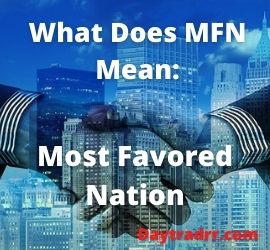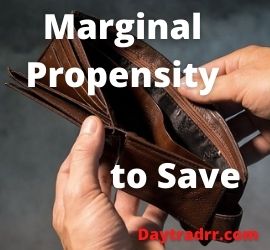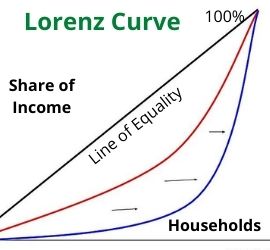What Does MFN Mean?
 What does MFN mean? It is an acronym for Most Favored Nation status. It represents a high level of treatment from one state to another in international trade and finance. The term comes from the field of international trade.
What does MFN mean? It is an acronym for Most Favored Nation status. It represents a high level of treatment from one state to another in international trade and finance. The term comes from the field of international trade.
Treaties and trade agreements often include provisions that require a nation to receive a minimum level of treatment.
MFN status does not give preferential treatment to a single trading partner. Rather, Most Favored Nation status pledges minimum treatment equal to any other trading partner. This is in terms of tariffs, quotas, and trade barriers, among others.
What does MFN mean in international trade?
Most-favoured-nation (MFN) means treating other trading partners equally. Under the WTO agreements, countries cannot normally discriminate between their trading partners. You can’t just grant someone a special concession like lower customs duty rates for one of their products. If you do, you have to do the same for all other WTO members you trade with.
What Does MFN Mean in Finance?
Most favored nation startups are new companies that have a most favored nation or MFN clause in agreements with investors. This clause keeps later investors from getting better terms than the first investors. Therefore, it is completely different from the clause that involves countries. In business, Most Favored Nation Clauses are terms in many convertible notes. Convertible notes are loans from investors that convert into equity or stocks when the company reaches prenegotiated milestones. An MFN clause in a convertible note keeps another investor from getting more equity for a similar loan when the company is more successful.
When used, MFN clauses make sure all parties in a contract get equal terms. MFNs let smaller first investors get the same favorable terms as larger companies that take part in the next round of investment. MFNs usually last until the next round of financing also called an equity round. Many businesses rely on friends and family for the first investment.
MFNs encourage good relations between founders and investors. Some MFN notes even include a lower valuation cap than the first angel notes. That way, the lack of a cap can’t give later investors a better deal. MFNs are a great way to attract and reward your first investors, including friends and family. They let startups show early successes to venture capital firms, angel investors, and others instead of relying on the potential of a great idea to get investments. (Source: upcounsel.com)
What does MFN mean in Business?
What Does MFN Mean in a Contract?
The most favored nation clauses in business are contract terms that ensure equal treatment. MFN status provides rights and benefits under the contract that are equal to or better than the rights and benefits received by any other party. For example, consider the right to most preferred customer pricing on a product. You would know that you were receiving at least the same price breaks as any of your competitors. In other words, you have the contractual right to purchase the item at the lowest price attainable. Additionally, no competitor could undercut your prices due to cheaper prices for goods from the same supplier.
MFNs are among the most commonly reviewed terms in contract review situations. The review can uncover various risks and potential advantages:
- Price flexibility – Understanding the prevalence of MFN clauses in a set of contracts gives visibility into the price flexibility available.
- Duty to notify – Price changes to one customer under a contract can trigger a duty to notify other customers with MFNs of the change and change prices to them all. If you don’t know if you have any most favored customer provisions, giving a great introductory offer to a new customer is extra risky. You may have to give the benefits of your great deal to already-existing customers. Some types of MFNs in specific situations have attracted scrutiny from US antitrust enforcement authorities.
What Does MFN Mean in M&As? Does it Matter?
MFNs can have serious and unexpected ramifications in the context of Mergers & Acquisitions. If you acquire a business, and it has a most favored customer provision in any of its contracts, the terms of that MFN could apply to the acquirer. This applies to existing contracts with small, seemingly unimportant customers.
So, for example, imagine a small software company gives Bank of America a great deal just to get the benefit of having the BoA “logo” among its customers. Bank of America—already getting a great deal—also demands and gets an MFN in the contract. If IBM then buys the small software company, depending on how the most favored customer clause is drafted, IBM could become subject to it. IBM might well do hundreds of millions of dollars of business with Bank of America, and having to give them most favored customer pricing across all of that could be a business disaster. So, savvy acquirers take finding MFNs across all of a target’s contracts exceedingly seriously. A bad MFN could be more costly than the price of the acquired business itself. (Source: kirasystems.com)
What Is the Most-Favored-Nation Clause?
In international trade, a most-favored-nation (MFN) clause mandates a government to extend to all other World Trade Organization member countries any concessions, privileges, or immunities granted to one nation in a trade agreement. The term most-favored sounds like special treatment for any nation granted such status. However, it actually denotes equitable treatment to all countries and trading partners. The MFN only applies to normal trade relations. It does not apply to free-trade agreements such as NAFTA.
The most-favored-nation clause is a stipulation that mandates a country cannot discriminate in trade matters. Countries must provide concessions, rights, or immunities awarded to one nation in a trade agreement to all other World Trade Organization members (WTO). It is a position in international economic relations that is intended to promote equal treatment of all member countries in international trade.
International trading issues
- Tariffs – A tariff is essentially a tax on imports and exports between trading countries. It is a policy that is usually in place to tax foreign goods and encourage the consumption of domestic products. Tariffs are also used as a form of income for a country’s government. For exporting countries, a low tariff is favorable, as the exporter can trade more freely.
- Import Quotas – Import quotas refer to a trade restriction that sets an upper limit on the number of goods that can be imported into a country over a given time. It encourages less consumption of foreign goods, and like tariffs, encourages the consumption of domestic products. For exporting countries, securing a high import quota is favorable, as the exporter can export more goods.
- Free Trade Agreement – A free trade agreement is a treaty or agreement in international law that forms a free-trade area between the cooperating countries. It encourages more trade and can result in eliminating tariffs and import quotas.
- Custom Unions – Customs union is a type of trade bloc, which is an area of free trade within member countries that share a common external tariff with non-member countries. They are established through trade pacts and encourages more free trade between member countries. (Source: corporatefinanceinstitute.com)
Intended Benefits of the Most-Favored-Nation Clause
The most-favored-nation clause offers the following benefits:
- Increases free trade – The most-favored-nation clause increases trade creation and decreases trade diversion, essentially encouraging more free trade between countries. It allows more efficient outcomes since the lowest cost producers can export goods to areas with the highest demand without government intervention.
- Equal treatment of disadvantaged countries – The most-favored-nation clause allows smaller countries to participate in advantages that they may not normally receive since they are overlooked among the large global trade players. The clause helps the small countries to negotiate favorable trade terms that they normally would not receive.
- Simplifies trade laws – The implementation of the most-favored-nation clause simplifies the complex trade agreements established bilaterally between countries. If all countries are under the same trade terms, it makes trade laws much simpler. (Source: ibid)
Predictability: through binding and transparency
Sometimes, promising not to raise a trade barrier can be as important as lowering one, because the promise gives businesses a clearer view of their future opportunities. With stability and predictability, investment is encouraged, jobs are created and consumers can fully enjoy the benefits of competition — choice and lower prices. The multilateral trading system is an attempt by governments to make the business environment stable and predictable. (Source: wto.org)
Up Next: What is Marginal Propensity to Save (MPS)?
 Marginal propensity to save (MPS) refers to the proportion of the next dollar received that a consumer would save as opposed to spending.
Marginal propensity to save (MPS) refers to the proportion of the next dollar received that a consumer would save as opposed to spending.
Economists use marginal propensity to save (MPS) to measure the link between changes in income and changes in savings. It refers to the fraction of a salary increase that a consumer saves rather than spends on goods and services. The marginal propensity to save is commonly thought to be larger for wealthier people than for poorer people.
The marginal propensity to save (MPS) in Keynesian economic theory analyzes increases in aggregate income. MPS is defined as the proportion that a consumer saves rather than spends on goods and services. In other words, it is the percentage of additional income that is saved rather than spent. MPS is calculated as the change in savings divided by the change in income and can be graphically depicted by a savings line. A savings line is a sloped line made by charting the change in savings on the vertical y-axis and the change in income on the horizontal x-axis to represent MPS.




